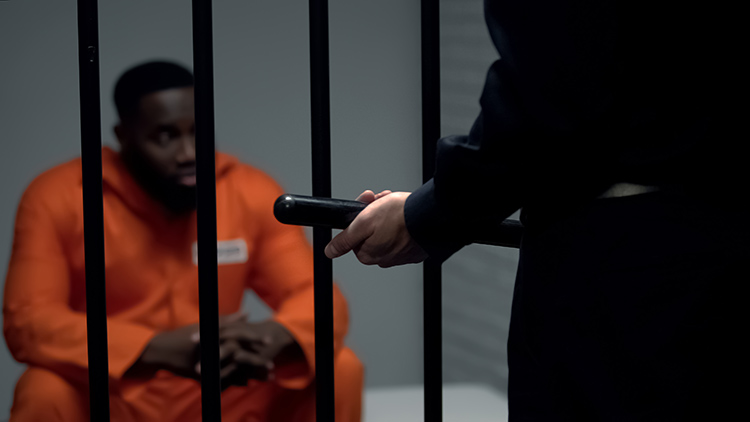'Not Built for Us': Winner of the Ross Writing Contest for Legal Short Fiction

Images from Shutterstock.com.
Editor's note: The following short story by Yvette Butler, a lawyer who promotes economic security for survivors of domestic violence, was the winner of the ABA Journal's seventh annual Ross Writing Contest for Legal Short Fiction.
Demetrious Johnson. One of my favorite cousins—and the black man in an orange jumpsuit. I placed my hand on his shoulder and tried to look at him reassuringly. We both chose careers that touched the law. I became a civil rights attorney and he was a community organizer. It made for especially interesting Thanksgivings since we didn’t always see eye to eye on strategy. Demetrious felt I was too soft. I just felt you could get more done from the outside of a jail cell.
“All rise!” A middle-aged, balding white man in a black robe came out from a door to the side of the room: Judge Burne. He sat down, and everyone else followed suit.
“Will the parties please introduce themselves?”

Standing up, I smoothed my skirt with my hands and buttoned my suit jacket. “Felicity Jones, your honor. I’m counsel for the defendant, Demetrious Johnson. I’m temporarily appearing pro hac vice from out of state. Maxine Day is here as well. She is local counsel, appearing just for this hearing.”
The prosecutor, a young redhead stood up. “Jennifer Dwight, representing The People, your honor.”
“Let’s see …” the judge adorned his reading glasses, small and square. He was hunched over a stack of papers. The judge peered over his glasses to stare at my cousin.
“You’re being charged by the state with one count of … terrorism.” The judge, still peering over his spectacles, shot a glance to the prosecution. “Is that right?” he inquired.
“Yes, your honor.” Ms. Dwight stated confidently before sitting back down.
“Mhm,” murmured the judge. “Well, I don’t see many of these. How do you plead, Mr. Johnson?”
“Not guilty, your honor,” my cousin calmly replied.
“Very well. Trial date is set for December 13. How about where Mr. Johnson will stay until then?”
“Your honor, we request Mr. Johnson be released on his own recognizance. He has been a resident of this state for his entire life. He is held in high regard by his community. These charges are baseless.”
Ms. Dwight sprung to her feet. “The prosecution vehemently disagrees. These are serious charges. Mr. Johnson has a history of criminal conduct. In this instance, the state believes he was inciting violence. He was caught trying to intimidate city officials by discharging dangerous weapons into a group of people and encouraging others to join in the intimidation tactics. His community would only support his dangerous activities further.”
“Your honor, it is a central tenet of our justice system that the accused are innocent until proven guilty. The state has not presented any actual evidence at this point that my client was inciting violence. He was merely exercising his First Amendment right to assemble and speak about the issues his community is facing. Furthermore, this ‘dangerous weapon’ to which the prosecutor alludes was nothing more than a T-shirt gun. The shirts merely had the logo of the ‘People of Color Collective’ or ‘POCC.’ It is no secret that the nonwhite residents of New Columbia are often the targets of police violence. It isn’t illegal for them to assemble to discuss their shared issues. Moreover, any prior charges to which the prosecutor alludes were dismissed. His prior arrests were for nonviolent misdemeanors.”
Judge Burne sat up straight. “Counsel, the court must make a decision for the good of this city, regardless of the guilt or innocence of the defendant, you know this, or don’t they teach you that where you’re from? These charges are serious, and I’m inclined to believe that the state’s attorney would not have brought these charges if they were completely baseless. A terrorism allegation is serious indeed. And if this habitual offender was persuading his fellow community members to bring violence to this jurisdiction, well, I can’t very well send him back to them, can I?”
“But your honor,” I tried to keep my cool. I had to walk that line of passionate, but not too assertively. White people had a habit of interpreting the slightest resistance as a threat. “Mr. Johnson is the victim of racist charging decisions. The prosecution never would have brought these charges if–” “Well now who’s responsible for making accusations without any evidence?” The judge snapped. “There will be no further discussion on this matter. This is not an issue of race; it’s one of violence. Request for ROR denied. The defendant will be held in custody, pending the resolution of his trial. We’re adjourned.”

“I can’t believe I’m fully rested. Ugh. Gross.”
Wiping the drool from one side of my face, I turned over to see my husband sleeping peacefully in the glow of the sun. My heart swelled with love as my eyes slowly inspected him. He had broad shoulders and big biceps that, despite not having been to the gym in months, were still looking quite bulky. I reached out to put my hand on his head of full black hair, his curls soft and tight. In that moment, I couldn’t help but think that the very features that drew me to him—the broad shoulders, large frame, dark skin, full lips and a wide nose—were the very features that could get him jailed or killed for looking at a police officer the wrong way. I cuddled up to him to enjoy our last few minutes in bed together before the start of the day.
As if on cue, our daughter, Tempest, burst through the door and started jumping on our bed as my cellphone lit up and began ringing.
“Hey T, please cut it out,” I grumbled, irritated as I rolled over, reaching for my phone. I looked at the screen. My mother? I checked the time: 7:05 in the morning. Why was she calling me so early?
“Honey, could you get T started? I need to get this.” My husband, Xavier, groaned, having just been awakened from a deep sleep and rolled out of bed. “Whatever you need, my love.” He picked up a giggling Tempest and slung her over his shoulder. I couldn’t help but smile as our beautiful daughter waved to me over Xavier’s shoulder. Her happiness was contagious.
“Couple goals achieved,” I thought to myself as I answered the phone.
“Hi, mom. What’s up?” I said, a frog still making its way out of my throat.
“Hi, Felicity. Sorry to wake you so early. I know you’re not a morning person, and you haven’t had a chance to eat. Try not to get hangry with me.”
I rolled my eyes and rubbed my face with my free hand. “Sure mom. What’s the emergency?”
“Your cousin, Demetrious, is in trouble.”
“Again?” I asked. Demetrious was used to being arrested. It was a natural consequence of his activism.
“Yes. He’s been arrested in a protest. They’re charging him as a terrorist.”
Any bit of dreariness dissipated. I stood up from the bed. “A terrorist? How? Why?”
“I don’t know. But you have to help him.”
“Where was he arrested?”
“In New Columbia.”
I sighed and raked my hand through my tight, black curls until it couldn’t go any further. I wiggled my fingers slowly, working my hand out of the kinks.
“Mom. I can’t help him personally. I’m not licensed there. I might be able to find someone who can help.”
“We’ve tried those avenues, Fee. We don’t have the money to hire someone. No one here will help him for free. And you know how he doesn’t trust public defenders.”
My mind was racing. I imagined Demetrious alone in a cell, potentially for good. I was angry at him for whatever he had done. I was scared for him knowing it didn’t matter what he did or didn’t do. He needed help. “OK, mom. I’ll see what I can do. Just give me some time to think. When is his hearing?”
“It’s in four days, Fee.”
“Four days?! You couldn’t give me any more notice than that?”
“I knew I should have called after you had eaten. Go get some breakfast. And call me when you calm down.”
My mom hung up the phone. I tossed my phone onto the bed and stared out the window. Of course, I wanted to help Demetrious. Like so many others, I had gone to school to help people. I mean, what good is a 300 grand investment if you can’t even help your own family?
Given the stress of the day, I decided to skip the shower. I slathered on some deodorant and strangled my hair into a messy bun with a scarf. I jogged downstairs to see how Xavier and Tempest were managing breakfast. Despite my cousins’ emergency, I had things to handle at home before I could think about him.

In the kitchen, Tempest sat on a stool at the kitchen counter. Xavier had served her yogurt and berries. She had taken her love of fruit after me. I kissed her on the forehead. After my thoughts this morning and the call from my mother, all I could think about was keeping my daughter safe.
“Okay, T, before you go to school today, what do I always tell you?”
Tempest looked up at me, her cheeks stuffed like a chipmunk. She took a moment to chew and swallow. She raised her index finger and wagged it at my face, mimicking my mannerisms.
“Never challenge your teachers” she said, matter-of-factly. “Get in, get educated, get out.” She smiled, already knowing that was the right answer.
“That’s right, baby. The most important thing is getting home safe. We can always talk about your questions at home.”
Xavier scoffed. “You know I hate that phrase, right? I challenged my teachers all the time, and I ended up just fine.”
I furrowed my brow at him. “That’s what luck looks like.”
Frustrated, I rose with everyone else in the courtroom as the judge disappeared into his chambers. I turned to my cousin.
“Demetrious. I’ll come visit you this afternoon.”
He nodded. He was clearly taking my advice to keep his mouth shut while in court. He would certainly have a lot to say later. We hugged, and I watched as the guards took him away. I turned to Maxine. She jerked her head to the side as if to say we should talk outside away from prying ears. I nodded and followed her out of the courtroom.
“What was that?” I asked her.
Maxine shrugged and removed her blazer. Her brown shoulders glistened in the sun. “I told you it was rough here. We don’t argue about race very often, no matter how relevant it is.”
I sat on a bench and put my head in my hands. Normally, my curls would fall in my face, but I was careful to blow dry my hair straight and keep it in a tight bun, so as to keep me looking as “professional” as possible for this Midwestern court. God forbid I wear my hair as it naturally grows out of my head. “I really appreciate you coming today, Max.”
Maxine sat down next to me on the bench. “Ah, don’t mention it. Anything for a friend.”
Max led a national civil rights organization. She was doing me a huge favor. They usually have a really hard time getting involved in cases out here. Pro bono is like a four-letter word. There was no chance of a money judgment at this stage, and she had executive directing to do. But she was the only person licensed to practice here that I could count on to consult about this case.
Maxine sighed. “I mean, when was the last time they charged terrorists out here? When was the last time a terrorist even came this far west?”
I looked up. “Don’t forget the KKK is out here. But you know as well as I do that white nationalists are never charged with terrorism. Especially not by a state this lacking in melanin.”
“You ain’t never lied, girl.” We chucked at the dark reality.

“Hey, Fee. Nice of you to visit.” Demetrious grinned at me.
“It would be nicer to see you if you weren’t locked up. What the hell happened?”
His eyes narrowed. “You know what happened. A black man tried to resist. And now they’re trying to lock me up forever.”
I rolled my eyes. This is exactly why I told him to be quiet in court. “Don’t be so dramatic, Demetrious. I’m a civil rights lawyer. I know full well how racism works. But I’m guessing it was more than just being black that got you in here. I know the gist, but tell me what you actually did.”
“I’m not being dramatic, Fee. Like I told you, POCC was protesting because some state troopers shot one of my neighbors, Marcus, an 18-year-old, after pulling him over for speeding. He was unarmed. Wasn’t resisting. The officer got paid leave. Paid leave for shooting an unarmed black kid! You’d think they’d charge him with terrorism, not me. So, I organized a protest outside city hall. I thought it would be a good idea to invest in a T-shirt gun. You know—metaphor and practicality.”
“You’re sure that’s all you did? You didn’t have any weapons? Didn’t tell people to burn down the city or anything?”
“Fee, you know me. I tell it like it is, but I never call for violence. I only encourage POCC and its supporters to demand political change by showing up for protests, canvassing, writing firmly worded letters. Hosting community listening sessions. You know. Organizing.”
I spent some more time with Demetrious getting all of the details. It really sounded as if he didn’t break the law. The charges were outrageous.
“So, can you help me, Fee?” he asked.
“Not directly,” I responded. “I’m not licensed to practice here. Maxine was only free today, since this was an emergency. She can’t take on the duty of local counsel, it’s just too taxing to review every filing and come to every hearing. We have to try something else. Why not just lean on your public defender?”
“Because, Fee. All the defenders here are white. And not just white, but white. And they’re busy. You and I both know how this system works. Under resource the public defenders so that they don’t have enough of their time to go around to the poor and the brown.”
“Sure. But they know this court. They know this judge. And they’re all really well- equipped to handle the procedural and substantive issues here.”
“Equipped to handle your run of the mill charge. But a racially motivated charge for a protest? I don’t think so.”
“D. This charge is bogus. We both know that. But it’s unlikely a jury would agree that you were trying to overthrow the city government with a T-shirt gun. No one was injured. It’s just silly. You don’t need to argue about race here. Just negotiate a dismissal with the prosecution or win at trial.”
Demetrious shook his head. He looked disappointed in me. “Fee. It is about race. We have to call attention to the racist motivation behind the charge. Truth matters, and I don’t want to get out of jail while ignoring the truth! You’re the only one I have who would even get close to arguing truth on this one.”
“But, Demetrious! Just. Get. Out. You have family and friends. You could go to prison. Do you hear me? Prison over freedom? You heard the judge. He doesn’t want to hear it. Why not just get out and then sue them for false arrest and malicious prosecution? Get your truth that way. You can get a jury to acquit you of a charge without bringing up how racist the system is.”
“Your reliance on the law is infuriating, Fee! It isn’t for us. It was never for us. The law exists to keep the powerful in power. I’m supposed to win a money judgment? Here? You’ve got to be kidding me. No. The only way is to fight this in the criminal system. The home of oppression.”

“That’s short-sighted, Dem. Who cares if the law wasn’t built for us? We use it to our advantage. Find new meanings and use it to liberate us. But in order to use it, you have to stay within its bounds. You want me to help you. How exactly am I supposed to do that? By breaking the law and representing you myself? Do you know what would happen if I colored outside the lines on this one?”
“You’d be right here in this jail with me? This is what coloring outside the lines looks like, Fee. I didn’t play by their rules. So now I’m here. My only crime was to encourage others to color outside the lines as well.”
“Even if Judge Burne doesn’t get in the way of presenting your case the way you want, you know how people shut down when they’re forced to confront something that makes them as uncomfortable as racism.”
“That doesn’t matter. We can’t make any progress if we don’t confront the truth. It’s a privileged place they sit in: to be able to ignore anything that’s uncomfortable. But we have to make them uncomfortable. It’s our necessity. Do you think I enjoy being arrested on a regular basis? Do you think I enjoy the state being able to point at me as just another statistic? A deviant black man? No. But I don’t have the luxury of sitting back and waiting for things to change. I know that’s why you went to law school. I know that’s why you do what you do. Because we don’t have the luxury of inaction. Our liberation is won through tears and pain and sacrifice. It has been for at least the last few hundred years.”
I sighed. He was right, and I knew it. But what bothered me was the “how.” How could we fight this? The charge wasn’t anything more than color and privilege. We really didn’t have many options. The public defender on the case wasn’t equipped to handle it. The law that I relied on in my own practice was the same law that prevented me from helping my cousin. That prevented people everywhere from helping family members. It was a frustrating hole in the law: You can represent yourself but not those you care about, even if they reject the option of counsel provided by the state.
“I came in here expecting to have to turn you down. But I have an idea. I considered just being your ghostwriter. I could feed you arguments, you could represent yourself, and a public defender would be by your side to help with objections and presenting evidence correctly. But that would never work because the public defenders have too much to lose if they make the judge angry. Their system relies upon good feelings between judge, prosecutor and defender to get their clients the best deals. Instead, I think our best bet is a motion to dismiss the charges that’s filed with my motion to represent you. Motions to dismiss are almost never successful in criminal cases, but we might as well try. I’ll file a motion to represent you. Just know that Judge Burne might deny it. If that doesn’t work, we’ll have to reassess. I don’t think he’ll give me another shot in his courtroom.”
Demetrious smiled a big toothy smile. “That’s all I’m asking for, Fee. Thank you.”
“The court will now hear New Columbia v. Johnson. Motion to Represent Defendant and Motion to Dismiss.” The deputy clerk barely looked up from her paper as she called the name of our case. She then looked out to the gallery of the courtroom, peering over her glasses for movement. I briefly made eye contact, then looked down at my belongings as I calmly and swiftly closed the binder that was open in my lap. I walked confidently to defendant’s table. Demetrious was already there. We nodded to each other. He grinned at me. I knew he was excited for this. I was nervous.
Judge Burne sat back in his chair and looked down his nose at us. “No need for introductions. I know everyone here. Ms. Jones, these are your motions. Proceed.”
“Thank you, your honor. First, I’ll address my motion to represent Mr. Johnson. As this court is aware, I am not licensed to practice in this jurisdiction. However, Mr. Johnson doesn’t have the funds to hire private counsel. He also respectfully declines the services of appointed counsel. Instead, he would like me to represent him in this case. Mr. Johnson would be eligible to represent himself but lacks formal legal training. I request this court grant him my representation as an attorney with experience in criminal law and civil rights litigation. The rules on unauthorized practice of law are for the protection of the public as a whole. However, I’m not trying to represent the whole public. I’m just here for Mr. Johnson. The rules also overlook the plight of thousands of unrepresented, often indigent litigants and litigants of color, who would benefit from having an advocate, licensed or not, to help them through the system.”
Judge Burne audibly sighed from the bench. “Why is everything about race with you, counselor? In any case, Mr. Johnson is able to take full advantage of the public defenders in this county. He chooses to be unrepresented, seemingly for no good reason. But I’ll take it under advisement.
“Proceed with your motion to dismiss.”
I took a silent deep breath before continuing. “As I alluded to in Mr. Johnson’s previous hearing, these charges allege that Mr. Johnson committed terrorism by discharging a T-shirt gun at a peaceful protest. There is no case law that supports the prosecution’s stance that a T-shirt gun is a weapon that would coerce or intimidate the civilian population or the government to bend to his will. Furthermore …” I trailed off. I knew I could end here. Demetrious wanted me to push the racial motivation behind this charge. I had the data: No white nationalist groups were ever charged under the same statute. I had historical facts: No police officers who let angry white citizens attack black school children during integration were charged under this statute. I could see Demetrious’ hopeful face nodding at me to keep going.
I briefly closed my eyes. In that split second, I considered my comfortable home life. My lucrative law practice. I imagined Tempest growing up and pursuing her dreams. I remembered that the odds were stacked against her. Her life would be full of potholes. She could be suspended from school for being disruptive. The school might even call the cops on her for speaking out of turn. That means her life could be sent into a tailspin—forced interaction with the criminal system for the rest of her life if she didn’t color within her own lines, quiet and obedient. Do I really want to be teaching my daughter to be silent and stay hidden? Yes. For her safety. No. Because we have to speak up. But what is life if you’re just surviving?
I inhaled and straightened my back and looked Judge Burne dead in the face. “Furthermore, your honor, the prosecution is bringing these racially motivated charges. There are only a handful of terrorism charges that have ever been brought in this state. None of them ever charged the Ku Klux Klan for their terrorism against the nonwhite residents of this state. None of them has ever charged the police with turning a blind eye toward the plight of black people within this very county. These charges have only ever been brought against people of color for challenging their mistreatment by the state.”
“Counselor–”
I kept speaking. I knew it was a cardinal sin to speak over a judge.
“In fact, the prosecutor should be reprimanded for bringing these charges. This nonviolent protest took place after the shooting of an unarmed black teenager. Has the prosecutor done anything to investigate that? Has that officer been charged with terrorism yet? This is clear bias. And I don’t see anything here but racism, your honor. For that reason, my motion should be granted, these charges dismissed, and Ms. Dwight and her office sanctioned!” Judge Burne was fuming. “Your motion is denied, Ms. Jones. Both of them. And I’m holding you in contempt. Maybe you’ll learn some respect after spending the night in jail. And you can bet, I’m filing a complaint against you with your state bar association.”
I knew what was coming and had prepared my family for this outcome. As the bailiff came to take me away, I looked at Demetrious and we smiled at each other. Nothing felt better than the truth.

Yvette Butler is director of capacity building and systems change for the Center for Survivor Agency & Justice. Before joining CSAJ, Butler was the director of policy and strategic partnerships with the Amara Legal Center, a Washington, D.C.-based nonprofit providing legal services to sex workers and survivors of trafficking in Washington, D.C., Maryland and Virginia. Butler also was a law clerk to a federal magistrate judge in her home state of South Dakota. Immediately after law school, she was a civil rights attorney fellow with the federal civil rights litigation firm Victor Glasberg & Associates. Butler earned her JD from George Washington University Law School and is licensed to practice in the District of Columbia and Virginia. Hear more from Butler about her work and her inspiration for Not Built for Us in this August 2019 interview with the ABA Journal.



